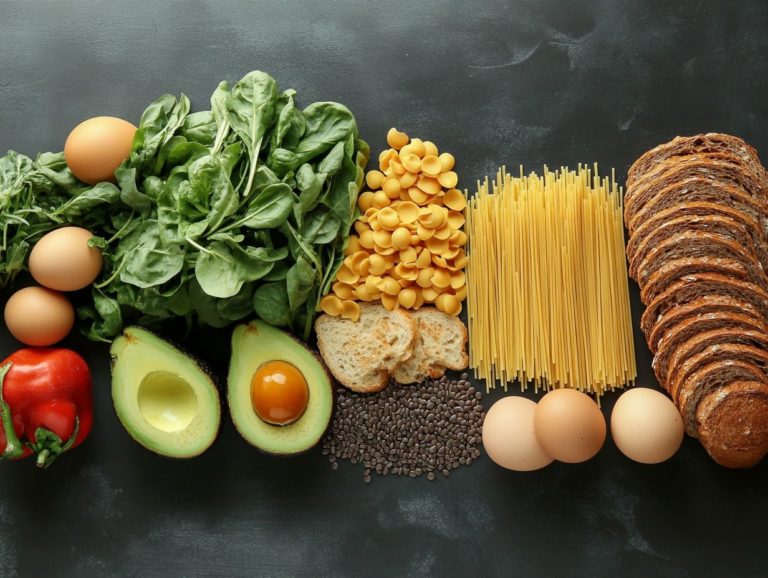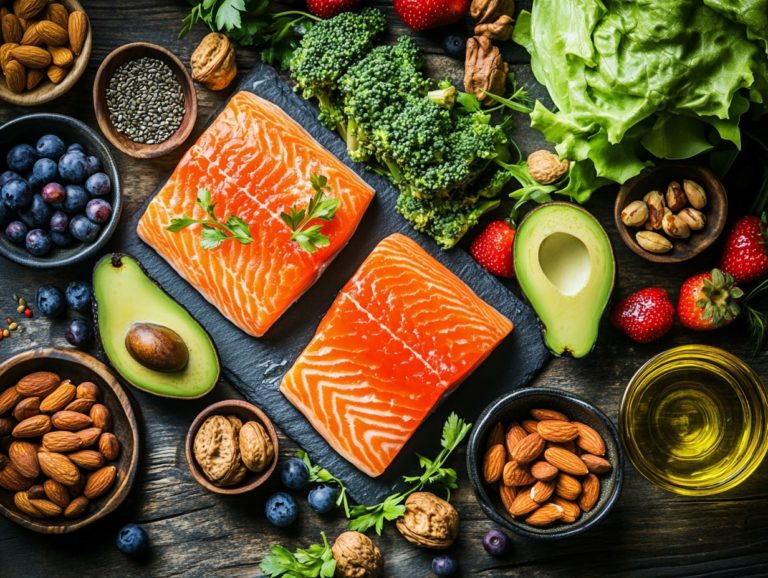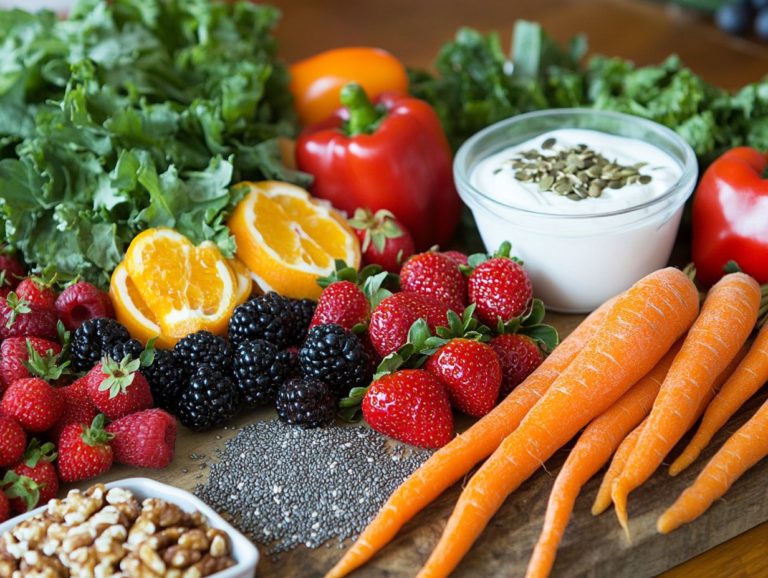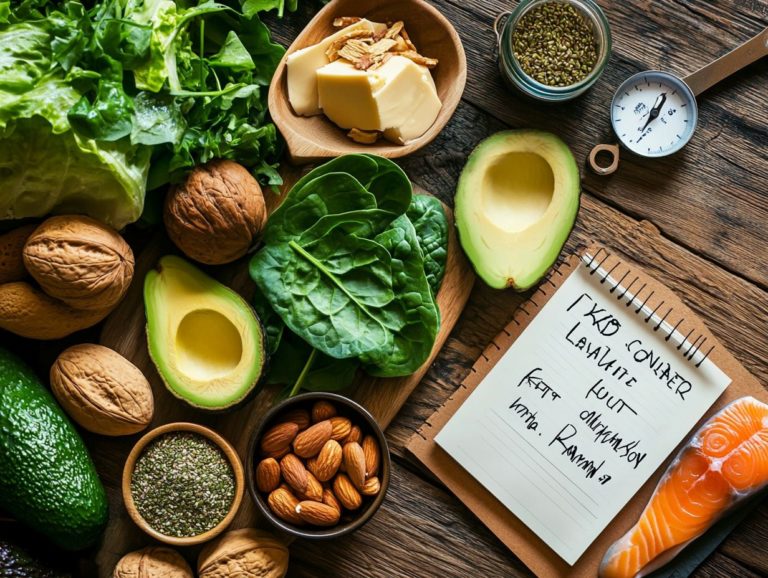Essential Nutrients for Keto Beginners
The ketogenic diet has gained popularity, celebrated for its remarkable potential to facilitate weight loss and bolster mental clarity. However, embarking on this low-carb journey requires more than simply eliminating sugars and starches. Grasping the importance of essential nutrients and understanding the associated health goals is fundamental to your success.
This beginner’s guide delves into the intricacies of the keto diet, underscores the vital nutrients you should prioritize, and offers valuable tips to ensure you meet your nutritional needs and achieve consistent goals.
Whether you re just starting with keto or seeking to enhance your approach, this information will empower you with the knowledge necessary to flourish on your dietary journey and make informed dietary adjustments.
Contents
- Key Takeaways:
- What Is the Keto Diet?
- What Are Essential Nutrients?
- Why Are Essential Nutrients Important on the Keto Diet?
- What Are the Essential Nutrients for Keto Beginners?
- 1. Protein
- How Can You Ensure You Are Getting Enough Essential Nutrients on the Keto Diet?
- Your Guide to a Healthy Keto Lifestyle
- What Are Some Common Nutrient Deficiencies on the Keto Diet?
- How Can You Overcome Nutrient Deficiencies on the Keto Diet?
- 1. Increase Intake of Nutrient-Dense Foods
- 2. Consider Supplements
- 3. Monitor Your Nutrient Intake
- Frequently Asked Questions
- What are the essential nutrients for keto beginners?
- Why is it important to consume enough fat on a keto diet?
- How much protein should I eat on a keto diet?
- Can I eat any vegetables on a keto diet?
- Should I take supplements while on a keto diet?
- Can I still get all the essential nutrients on a keto diet?
Key Takeaways:
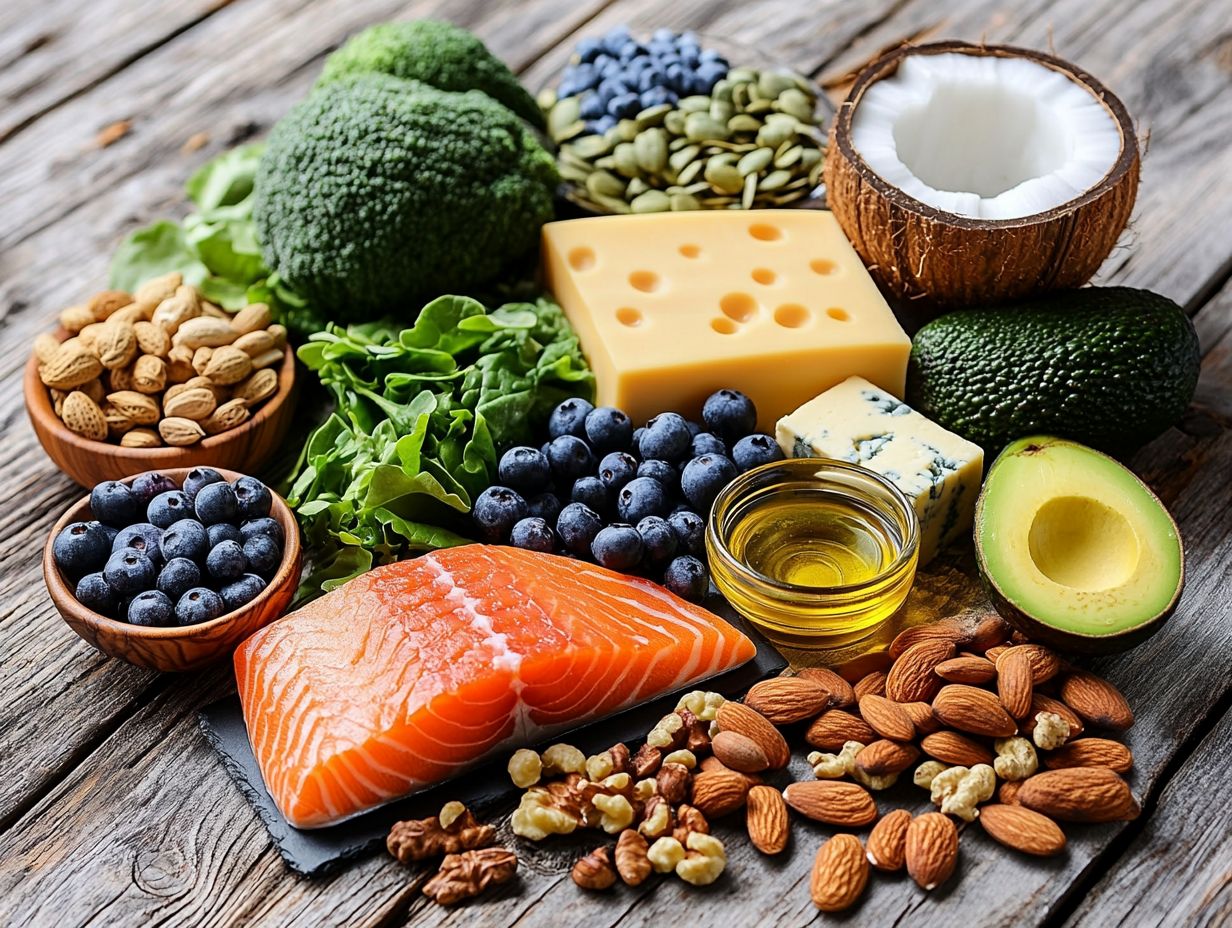
- 1. Understanding what essential nutrients are and why they are important on the keto diet is crucial for beginners to achieve success.
- 2. Keto beginners must prioritize consuming adequate amounts of protein, healthy fats, fiber, electrolytes, vitamins, minerals, and water for optimal health and weight loss, keeping in mind their specific calorie goals and exercise needs.
- 3. To ensure sufficient intake of essential nutrients, keto beginners should plan their meals, choose nutrient-dense foods, consider supplements, and stay hydrated.
What Is the Keto Diet?
The keto diet, often referred to as the ketogenic diet, is a high-fat, low-carbohydrate dietary strategy that has gained popularity for its impressive potential to aid weight loss and enhance overall well-being.
By sharply lowering carbohydrate consumption and substituting it with fat, your body transitions into a metabolic state known as ketosis. In this state, your body becomes remarkably adept at burning fat for energy.
This dietary approach can have a significant and immediate impact on your insulin levels, making it a valuable weight loss tool in managing health conditions like metabolic syndrome, type 2 diabetes, and other ailments linked to body fat and glucose regulation, such as cardiovascular disease and even cancer.
What Are Essential Nutrients?
Essential nutrients are the crucial compounds that your body can’t produce on its own, so you need to obtain them through food. This includes macronutrients like carbohydrates, proteins, and fats, each playing a vital role in maintaining your health. When navigating the keto diet, it’s important to understand essential nutrients to ensure you’re getting enough while sticking to the low carbohydrate and high fat guidelines.
This knowledge helps you avoid the risks of nutritional deficiencies, supports your energy levels, and promotes optimal fat metabolism to meet your wellness goals.
It’s also important to consider micronutrients, such as vitamins and minerals, which are critical for your overall health and functioning within the ketogenic framework. For example, incorporating nutrient-dense foods like leafy greens and avocados into your diet can provide you with essential vitamins like A, C, and K, as well as important minerals like magnesium and potassium that are often neglected.
By striking a balance with these nutrients, you not only aid your metabolic processes but also support crucial bodily functions. This reinforces the importance of making informed and purposeful food choices. By prioritizing whole foods rich in these essential nutrients, you can effectively fuel your body while enjoying the myriad benefits of a well-rounded nutritional profile on your ketogenic journey, minimizing the risk of chronic conditions like Alzheimer’s Disease and Parkinson’s Disease.
Ready to kick-start your keto journey? Start making informed food choices today!
Why Are Essential Nutrients Important on the Keto Diet?
Essential nutrients are vital for those starting a keto diet, as they play a significant role in achieving calorie goals and maintaining health while preventing potential deficiencies. The ketogenic diet emphasizes low carbohydrates and high-fat intake, which can sometimes disrupt the balance of essential nutrients. This imbalance can impact your overall health, making it crucial to monitor your dietary changes closely. Adequate nutrient intake supports various bodily functions, influences energy levels, and aids in managing health conditions like metabolic syndrome, cardiovascular disease, and Multiple Sclerosis.
Each nutrient has a distinct role in optimizing metabolic processes, enabling your body to efficiently utilize fat for fuel. For example, healthy fats are essential for energy production, while vitamins and minerals support enzyme activity critical for metabolic reactions. When consumed in the right amounts, protein can curb cravings by promoting a sense of fullness, helping with weight loss and improving athletic performance.
Act now to ensure a balanced intake of these nutrients. This will not only help you chase your immediate weight loss goals but also lay the groundwork for long-term wellness, minimizing the risk of nutrient deficiencies and fostering a healthier lifestyle overall. Regular health assessments can help you stay on track with these goals.
What Are the Essential Nutrients for Keto Beginners?
As a keto beginner, understanding the importance of essential nutrients is crucial for seamlessly transitioning to the ketogenic diet and reaching your health goals. This means prioritizing nutrients that align with the diet s core principles of low carbohydrates and high fat while managing sugar intake and carbohydrate levels.
Key nutrients such as protein, healthy fats, fiber, electrolytes, vitamins, and minerals are crucial for maintaining energy levels, warding off the dreaded keto flu, and promoting overall well-being.
Make it a goal to include a variety of nutrient-dense, keto-friendly foods in your meals. This strategy helps manage cravings and protects you against potential nutritional deficiencies.
1. Protein
Protein is an essential nutrient needed in large amounts that plays a vital role in preserving muscle and promoting overall health, especially while navigating the keto diet. It’s crucial for preventing muscle loss during weight loss, particularly in a low-carb context. Incorporating high-quality protein sources like lean meats, fish, and plant-based options can help you meet your daily intake goals. This supports metabolic functions and enhances satiety, helping you control cravings on the ketogenic diet.
Consider adding eggs, nuts, and dairy to significantly boost your protein intake without derailing your carb limits. Optimize your meal planning by focusing on protein-rich breakfasts, lunches, and snacks, ensuring a steady supply of protein to support your weight management goals.
If you’re involved in fitness routines, timing your protein consumption around your workouts can enhance muscle repair and growth, leading to improved body composition. A balanced approach, where you thoughtfully adjust your protein intake based on your activity levels, can make a remarkable difference in achieving your desired fitness outcomes.
2. Healthy Fats
Healthy fats are absolutely essential to your ketogenic diet. They serve as the primary energy source for your body when you enter ketosis. They help your body burn fat effectively and support a variety of health goals.
By incorporating nutrient-rich fats from sources like avocados, nuts, seeds, and olive oil, you can help maintain balanced insulin levels, curb your hunger, and boost your overall energy all while staying true to the low carbohydrate principles of the keto diet.
As you embark on your keto journey, it’s crucial to understand the different types of fats. Saturated fats from coconut oil and grass-fed butter can enhance your body s fat-burning processes, while monounsaturated fats from olive oil and avocados can provide notable heart health benefits. Omega-3 fatty acids, found in fatty fish and flaxseeds, are also vital for reducing inflammation.
To effectively weave these beneficial fats into your daily meals, consider creating delicious salads drizzled with olive oil, snacking on a handful of nuts, or blending avocado into your smoothies.
Be mindful of portion sizes and incorporate variety to strike a balance of nutrients while enjoying the rich flavors that healthy fats bring to your diet.
3. Fiber
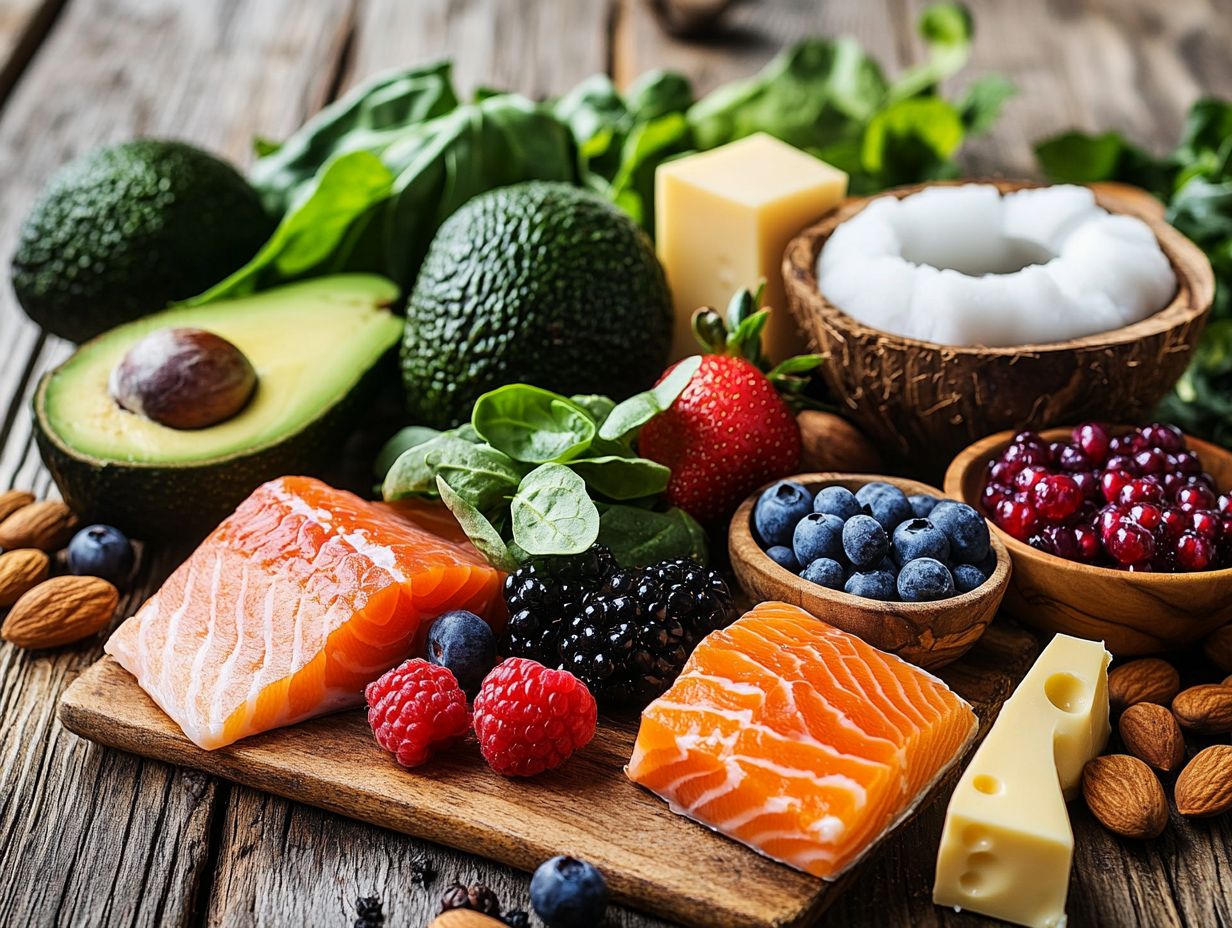
Fiber is an essential element of your balanced ketogenic diet, especially given the significant limitations on carbohydrate intake. It aids digestion and helps control those pesky food cravings by promoting a sense of fullness.
By incorporating high-fiber, keto-friendly foods like leafy greens, chia seeds, and avocados, you can enhance your overall well-being, support digestive health, and alleviate common issues associated with dietary shifts, such as the keto flu.
Integrating sufficient fiber sources into your low-carb regimen is vital for preventing gastrointestinal discomfort often encountered during this transition. With careful planning, you can maintain optimal fiber levels while staying within your carbohydrate limits.
Snack on delicious flaxseeds, crunchy broccoli, and tasty artichokes to meet your fiber goals! These foods not only satisfy your fiber needs but also ensure you re getting a diverse range of vitamins and minerals. This is especially important if you’re experiencing symptoms of the keto flu.
Monitoring your fiber intake is crucial for success on the keto diet, as this attention to detail will significantly contribute to long-term health.
4. Electrolytes
Electrolytes such as sodium, potassium, and magnesium are absolutely essential for maintaining fluid balance and supporting your metabolic functions, especially when you re on a ketogenic diet. With the dietary shifts that come with ketosis, it’s easy to encounter imbalances.
Ensuring proper electrolyte intake is crucial to ward off common issues like fatigue, dizziness, and muscle cramps, all of which can intensify during the adaptation phase. The keto diet can help you lose weight and manage carb intake effectively.
As your body transitions away from carbohydrates, you may experience increased water loss and the excretion of these vital minerals, making it even more important to pay attention to your intake.
To maintain a healthy electrolyte balance, consider incorporating foods rich in these nutrients into your meals, such as:
- Avocados for a potassium boost
- Leafy greens to provide magnesium
- Naturally sourced salts to replenish lost sodium
Staying well-hydrated is equally critical; make it a habit to drink ample water throughout the day to help mitigate the risk of depletion. Low-sodium broth or electrolyte supplements can be practical strategies to ensure you re getting enough nutrients.
Don’t let fatigue slow you down keep your electrolytes in check to fuel your keto journey!
5. Vitamins and Minerals
Vitamins and minerals are essential micronutrients that play many roles in maintaining your health, and their significance becomes even more pronounced on the keto diet, given its restrictive nature. It is crucial for you to ensure sufficient intake of key vitamins such as B vitamins and Vitamin D as well as vital minerals like calcium and iron. Failing to do so may lead to a lack of nutrients that can adversely affect your energy levels, immune function, and overall well-being.
Following the keto lifestyle can make it challenging to get enough of these nutrients. This may lead to unwanted health complications. Therefore, monitoring your carb intake and calorie goals is essential to avoid any nutritional deficiencies and maintain overall well-being.
To boost your B vitamin intake, look for foods like:
- leafy greens
- avocados
- nuts
For Vitamin D, salmon and mushrooms are your best allies. In terms of calcium, incorporating dairy products like cheese can make a difference, while red meats and fortified foods can help satisfy your iron needs.
If you find it difficult to meet your dietary requirements through food alone, considering high-quality supplements could be a wise choice. This way, you can ensure a well-rounded intake of these vital nutrients and support your health effectively.
6. Water and Hydration
Water is an often-overlooked yet crucial component of the keto diet, playing a vital role in hydration, digestion, and overall metabolic function. Adequate hydration not only supports fat metabolism but also helps mitigate the symptoms associated with the keto flu (the flu-like symptoms some people experience when starting a keto diet). It’s crucial for weight management and maintaining energy levels as well.
As your body adapts to ketosis, it tends to lose more water and electrolytes, making it essential to prioritize fluid intake to maintain health and optimize performance. Also, making dietary adjustments to include nutrient-dense foods and healthy fats can make a significant difference.
To ensure you stay properly hydrated, aim for at least 2 to 3 liters of water each day, adjusting based on your activity level and individual needs. Keeping a reusable water bottle close by can serve as a helpful reminder to drink more frequently and can aid in tracking your daily intake.
Hydration-enhancing foods such as cucumbers, celery, and broth are especially beneficial during the initial adjustment period. You can also consider electrolyte supplements to replenish lost minerals, which can help promote a healthy balance and combat fatigue as you transition into ketosis.
How Can You Ensure You Are Getting Enough Essential Nutrients on the Keto Diet?
To ensure you re getting enough essential nutrients on the keto diet, implementing effective meal planning strategies is key. Focus on incorporating a diverse array of nutrient-dense foods while making the necessary dietary adjustments.
If you re just starting out, creating a structured approach to your food choices will be beneficial. Prioritize healthy fats, proteins, and low-carb vegetables to help you meet both your calorie and nutrient goals. This helps you avoid common issues like nutrient gaps and annoying cravings.
1. Plan Your Meals and Snacks
Planning your meals in advance is a crucial step for achieving success on the keto diet. It ensures you re meeting your daily intake of essential nutrients while staying within those low carbohydrate guidelines. By outlining your meals and snacks ahead of time, you can strategically incorporate keto-friendly foods, control portion sizes, and manage your overall caloric goals with greater ease. This approach is particularly beneficial for those with specific health conditions or weight management goals.
This proactive approach not only helps you avoid impulsive food choices but also takes the stress out of daily cooking. When you re crafting your weekly menu, consider including a variety of proteins, healthy fats, and an assortment of low-carb vegetables to keep your meals diverse and satisfying.
Preparing meals in batches can further simplify your routine, allowing you to dedicate time to cooking just once or twice a week. Prioritizing keto-specific foods that satisfy your cravings while accommodating any dietary restrictions is essential. This way, your culinary journey remains enjoyable and sustainable throughout your dietary program.
In summary, paying attention to your nutrient intake and staying hydrated are vital for success on the keto diet. By following these strategies, you can enjoy a balanced diet while achieving your health goals!
Your Guide to a Healthy Keto Lifestyle
2. Choose Nutrient-Dense Foods and Healthy Fats
Choosing nutrient-dense foods on the keto diet is essential for you. These foods provide the vitamins and minerals you need while keeping your carbohydrate intake low, ultimately supporting your overall well-being.
By focusing on whole, unprocessed foods, you can avoid nutritional deficiencies and ensure that your body receives the vital nutrients required for optimal health.
Consider incorporating avocados into your meals; they are rich in healthy fats, fiber, and potassium. This can enhance both heart health and digestion.
Leafy greens like spinach and kale are another excellent choice. They offer a wealth of vitamins such as A, C, and K while maintaining a minimal carb count. These choices are essential for meeting your fitness goals.
Don t forget about fatty fish, like salmon. These not only provide beneficial omega-3 fatty acids for inflammation but also significantly boost your protein intake.
Nuts and seeds make for superb snacks. They are packed with nutrients and healthy fats, allowing you to satisfy your hunger without straying from your dietary goals.
Balancing these food choices is crucial. It helps maintain your energy levels and supports your health objectives without compromising your commitment to a keto lifestyle.
Staying consistent with your goals and regularly assessing your dietary needs enhance your overall well-being.
3. Consider Supplements
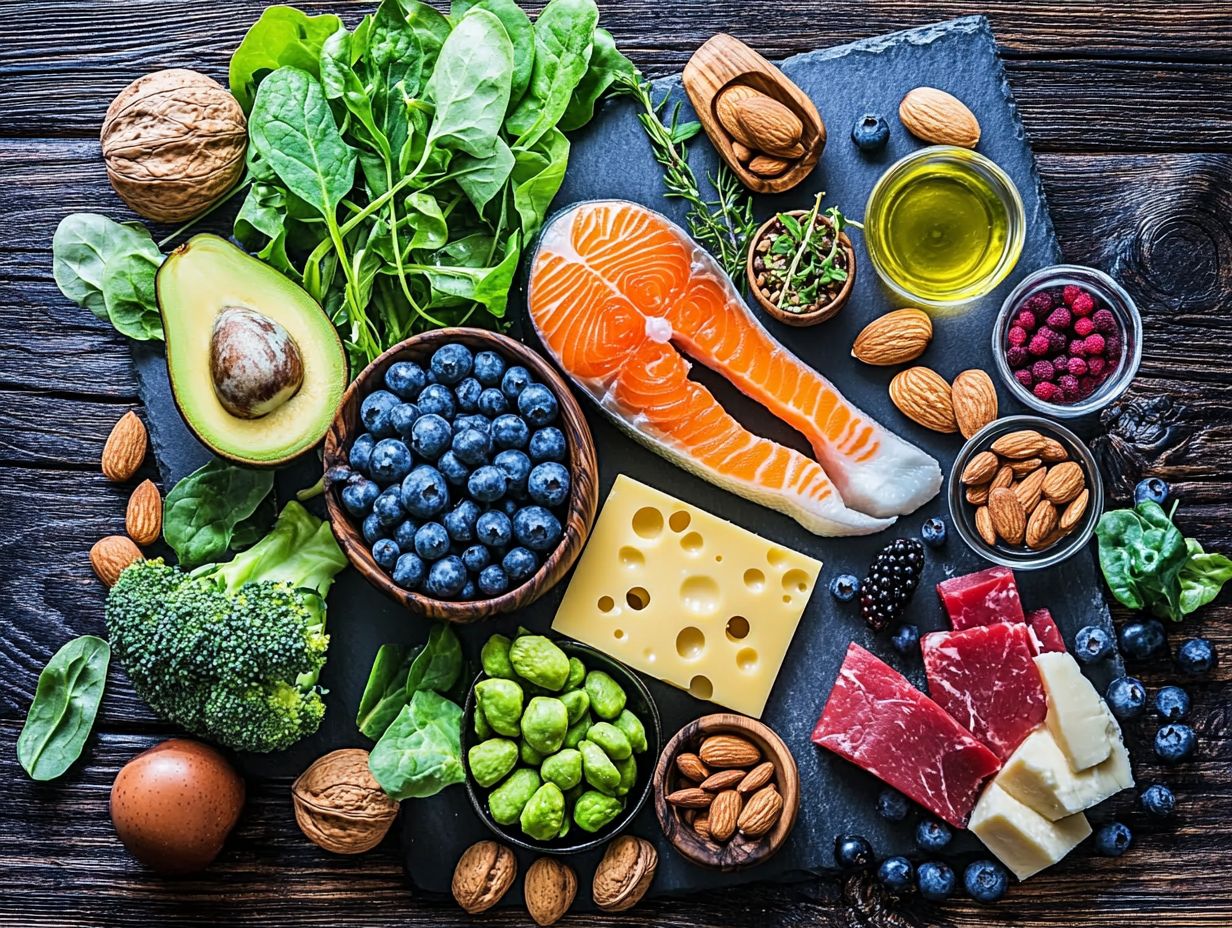
Considering supplements can be a smart choice to tackle potential nutritional deficiencies while on the keto diet. This is especially helpful if you find it challenging to meet your nutrient needs through food alone.
These supplements can bolster various aspects of your health, including electrolyte balance, vitamins, and minerals that often take a backseat in a low-carbohydrate regimen.
If you’re embarking on the keto journey, specific supplements like magnesium, potassium, and sodium can be particularly advantageous. They help maintain your electrolyte levels during the transition to ketosis.
Magnesium can help ease pesky muscle cramps, while omega-3 fatty acids offer valuable support for heart health. These nutritional supplements can also aid in managing insulin levels and glucose levels effectively.
When selecting high-quality options, prioritize products that undergo third-party testing to guarantee purity and potency. Consulting with a healthcare professional aids in personalizing your supplementation regimen and ensures it aligns with your unique health needs and dietary restrictions.
This ultimately fosters a balanced approach to your keto lifestyle.
4. Stay Hydrated
Hydration is your secret weapon on the keto diet! It helps you maintain optimal body function, aids digestion, and supports your energy levels, especially during the initial adjustment phase to ketosis.
Ensuring you drink enough water can also help reduce the symptoms associated with the keto flu, promoting your overall well-being.
To effectively manage hydration, consider tracking your daily water intake. This serves as a valuable reminder to drink enough throughout the day.
Incorporate hydrating foods like cucumbers, watermelon, and leafy greens into your meals. These not only boost hydration but also deliver essential nutrients.
It s crucial to pay attention to your electrolyte balance. Low carbohydrate consumption can lead to the depletion of vital minerals such as sodium, potassium, and magnesium.
Maintaining this balance not only aids in hydration but supports muscle function and helps prevent cramps during physical activities.
What Are Some Common Nutrient Deficiencies on the Keto Diet?
Common nutrient deficiencies can arise on the keto diet primarily due to the restrictive nature of carbohydrate intake, which limits access to certain food groups rich in essential vitamins and minerals. It is crucial to be aware of these potential deficiencies, as they can affect your energy levels, how your body uses energy, and overall health especially when managing conditions like metabolic syndrome and cardiovascular disease. Being mindful of these issues can help you achieve your health goals and maintain a balanced approach to your diet.
A lack of variety in your food choices can lead to insufficient intake of critical nutrients such as magnesium, potassium, and vitamins B and D. For example, if you are low on magnesium, you might experience muscle cramps and fatigue. Deficient potassium levels can cause weakness and irregular heartbeats, while inadequate vitamin B6 could contribute to mood swings and cognitive decline, impacting your daily life.
To address these challenges, it is wise to incorporate a diverse selection of low-carb vegetables, nuts, seeds, and possibly even supplements. This approach will help ensure that you receive a balanced array of nutrients essential for maintaining optimal health while enjoying the benefits of the keto lifestyle.
How Can You Overcome Nutrient Deficiencies on the Keto Diet?
Overcoming nutrient deficiencies on the keto diet is crucial to achieve optimal health and ensure your body functions effectively while in a state of ketosis.
By emphasizing a diverse array of nutrient-dense foods, considering appropriate supplementation, and diligently monitoring your dietary intake, you can mitigate potential risks and support your overall health goals while embracing this popular diet.
1. Increase Intake of Nutrient-Dense Foods
Increasing your intake of nutrient-dense foods is one of the most effective strategies to overcome deficiencies while on the keto diet. These foods provide essential vitamins and minerals without pushing you over your carbohydrate limits. By incorporating a variety of options such as leafy greens, low-carb fruits, and healthy fats, you can effectively meet your nutrient needs, support your energy levels, and enhance your overall health.
As someone following this dietary approach, integrating foods like avocados, broccoli, and almonds into your meals and snacks can significantly elevate your nutrient profile. Picture a keto-friendly salad drizzled with olive oil and sprinkled with sunflower seeds it’s not just satisfying; it’s a powerhouse for your lunch. For snacks, consider celery sticks paired with almond butter; they’re a delicious way to stay on track.
By thoughtfully planning your meals around these components, you are not only ensuring you are consuming essential nutrients, but you are also keeping those pesky cravings for high-carb options at bay. This approach supports your commitment to the keto lifestyle and ultimately contributes to improved health outcomes.
2. Consider Supplements
Considering dietary supplements can be a strategic move to address nutritional deficiencies that may arise from following the keto diet, especially when food sources are limited. High-quality supplements can deliver essential vitamins and minerals that support your metabolic health, enhance your energy levels, and elevate your overall well-being.
As you embark on your keto journey, pay particular attention to magnesium, potassium, and omega-3 fatty acids. These nutrients are vital for supporting muscle function, hydration, and cardiovascular health. Investing in a top-notch multivitamin specifically designed for low-carb diets can help you mitigate any potential deficiencies. To ensure you’re on the right track, refer to the essential nutritional guidelines for keto. However, it is crucial to prioritize the quality of these supplements and stick to the recommended dosages.
Before introducing any new supplement into your regimen, it is wise to consult with a healthcare professional. This way, you can receive personalized guidance tailored to your unique health needs and dietary preferences.
3. Monitor Your Nutrient Intake
Monitoring your nutrient intake on the keto diet is essential for meeting your dietary goals. It helps you steer clear of potential deficiencies.
You can easily achieve this through food tracking apps or journals. Regularly evaluating your macronutrient intake, which includes the nutrients that provide calories or energy: fats, proteins, and carbohydrates, ensures informed dietary adjustments.
Tools like MyFitnessPal or Cronometer help log meals. They also analyze nutrient profiles and let you see your daily consumption easily.
It’s wise to conduct regular health check-ups with a healthcare professional to gauge your overall well-being. This allows you to pinpoint any nutritional gaps.
Once you ve completed the assessment, you can refine your diet based on valuable feedback. Don’t wait! Proactively adjust your diet to ensure your intake of fats, proteins, and carbs aligns perfectly with your nutritional needs and desired outcomes.
This proactive strategy not only boosts your physical performance but also fosters long-term health and vitality.
Frequently Asked Questions

What are the essential nutrients for keto beginners?
The essential nutrients for keto beginners are fat, protein, and low-carbohydrate vegetables. These are the main components of a keto diet and help the body enter a state of ketosis.
Why is it important to consume enough fat on a keto diet?
Fat is the primary source of energy on a keto diet. Consuming enough fat helps the body enter a state of ketosis, where it burns fat for energy instead of carbohydrates.
How much protein should I eat on a keto diet?
The recommended amount of protein on a keto diet is between 0.6-1 gram per pound of body weight. Consuming too much protein can kick the body out of ketosis, so it’s important to monitor intake.
Can I eat any vegetables on a keto diet?
Yes, low-carbohydrate vegetables such as leafy greens, broccoli, cauliflower, and zucchini are allowed on a keto diet. These vegetables are nutrient-dense and provide important vitamins and minerals.
Should I take supplements while on a keto diet?
It’s important to focus on obtaining essential nutrients from whole foods. However, some supplements may be necessary on a keto diet, including electrolytes, omega-3 fatty acids, and vitamin D.
Can I still get all the essential nutrients on a keto diet?
Yes, it is possible to get all the essential nutrients on a keto diet with proper planning and variety in food choices. It’s important to consult a healthcare professional or registered dietitian to ensure nutritional needs are being met.

